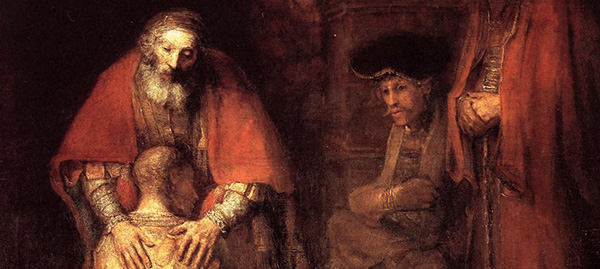
V/ I will turn to you O God,
R/ to God who gives joy to my youth
V/ Give me the Wisdom that sits by your throne;
R/ that I may be counted among your children
Lord, in your all-providential plan, you have led me to this moment to rediscover me in your Word and Wisdom. Aid me to make this time of meditation and prayer enriching, transforming, and liberating for my well-being and others. Amen!
THE JOY OF HOME COMING TO THE FATHER’S EMBRACE
By Dr. Joanne Mosley
LAETARE SUNDAY – FOURTH SUNDAY OF LENT
Joshua 5:9, 10-12; Psalm 34(33): 2-7; 2 Corinthians 5:17-21; Luke 15:1-3, 11-32
30th March 2025
The teachings of John of the Cross on the journey to union with God by the way of self-denial could appear less arduous if we began with his sketch of the allegorical Mount Carmel. For it shows us the destination, described as entrance into the land of Carmel where we may eat its fruit and good things. Laetare Sunday is just such a consolation along the way, where homecoming – arrival at our ultimate destination – is the overriding theme.
John’s quotation from Jeremiah (2:7), on the fruitful land of Carmel, echoes the passage from Joshua. The exodus journey is over; so, too, is the manna, for the Israelites are now in Canaan and can eat the fruit of the land. We meet them on the plains of Jericho, celebrating the Passover. The psalm surely captures their joyful emotions: ‘Glorify the Lord with me, together let us praise his name.’
In the gospel today – the wonderful story of the prodigal son – we see what this homecoming to God is like in human terms. It is far more than arrival at a land of plenty. It is a journey headlong into the embrace of the Father. This anticipates St Paul’s words on the salvation won for us by Christ, which will bring us one day to our heavenly homeland: ‘The old has passed away; behold, the new has come.’
We can imagine the emotions of Jesus as he tells this parable about his beloved Father. The two sons represent the public ‘sinners’ and the self-righteous group of Pharisees and scribes, the latter group complaining that Jesus is associating with the former. For all these people and for us, Jesus shines a light onto the compassionate heart of the Father.
But this parable also suggests precisely a distancing from the Father. Where the younger son, having asked for his inheritance in advance, goes off to a country that is far away. After squandering everything in loose living, he is destitute. He then decides to return to his father, admit having sinned, and ask to be treated as one of his father’s hired servants – which, with perhaps a sense of justice, is all he may feel he would deserve. But justice is not mercy.
As the young man gets closer to home, his father sees him in the distance – this is related to Luke’s earlier term describing the country that was far away. As the returning son gradually reduces this distance, making his way back, it is the father who, catching sight of him, rushes to close the distance, and does so beyond the son’s wildest dreams: for he is kissed and embraced, and welcomed back as son.
At this, the elder son now distances himself, refusing to go inside and rejoice. And protesting about his years of service, he shows that his heart has long been estranged from his loving father: he clearly sees himself in the role of a servant, and we are left with the father pleading with him to come in, and calling him his son, his ‘child’.
It is with this parable in mind that St Thérèse, a great teacher of God’s mercy, brings her autobiography to its moving close, with these immensely consoling words: ‘Yes, I feel it; even though I had on my conscience all the sins that can be committed, I would go, my heart broken with sorrow, and throw myself into Jesus’ arms, for I know how much He loves the prodigal child who returns to Him.’
This closing of the distance between ourselves and God is brought out for us theologically by St Paul who repeatedly speaks of reconciliation. ‘Christ reconciled us to himself,’ he says. At the same time, he urges us: ‘be reconciled to God.’ Like the ‘sinners’ listening to Jesus – which is all of us – may we, in the spirit of St Thérèse: draw near to him, take hold of him with our heart, and remain with him forever.
Daily Offering
Lord, I offer myself to you anew, in scaling the heights of Carmel by taking to heart your Word and Wisdom communicated through this time of meditation. May I be transformed into a prayer presence in the World. Amen
Questions for reflection:
• With regard to the manna, what insights can you glean that could enhance understanding of the Eucharist?
• How do you understand being ‘a new creation’ in Christ?
• How might you relate to God so as to give him the greatest joy?
Suggested Exercise for the Week
Ponder all the love with which the Father desires to save me from distancing myself through sin or self-righteousness. Seek a genuine relationship with God as a personal being.
Commit to Heart: Joyful in being saved
